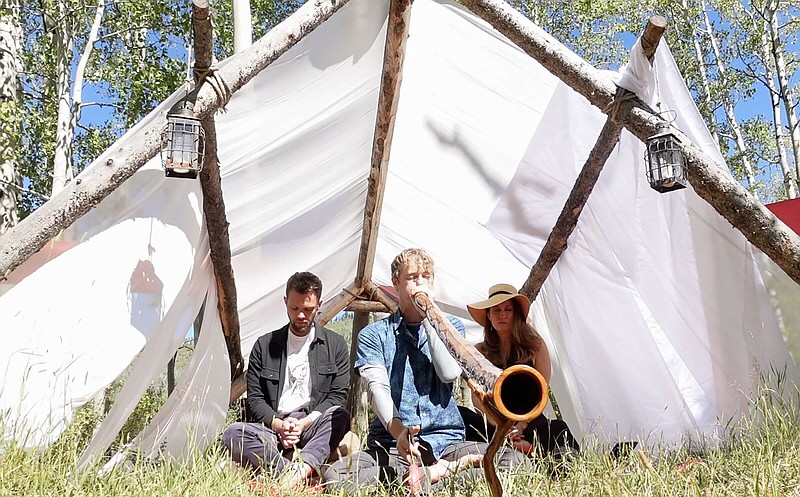Helping businesspeople try to optimize their performance by using hallucinogenic drugs is an eccentric and growing offshoot of the unregulated $5 billion field of executive and life coaching.
"Adderall, caffeine and stimulants helped with getting things done, but with the advent of AI, productivity is becoming less valuable. Psychedelics can help with the kind of divergent, creative thinking that's more required now," says Paul Austin, a lanky, bearded 33-year-old "microdosing coach" and founder of Third Wave, which offers courses costing as much as $14,000 to certify psychedelic guides.
There are new concerns about the credibility of scientific research on psychedelics, and about the effects of daytime dosing in the workplace. Still, drugs like psilocybin, or magic mushrooms, and MDMA, or ecstasy, are stirring widespread optimism in some quarters. They're believed to open people up to new ideas or change, a big draw for coaches.
Some coaches work openly at resorts in countries like Jamaica that haven't outlawed the drugs, while others operate quietly out of private homes or Airbnbs in the United States, where such drugs are federally illegal but authorities largely look the other way. They cater to a rise in popular interest, and often the particular yearnings of ambitious hedge fund principals, entrepreneurs or executives.
"I believe psilocybin helps me be a better me, and therefore helps me be a better leader," says Jim MacPhee, a 66-year-old leadership consultant who retired as chief operating officer of Walt Disney Co.'s Walt Disney World in 2021. He doesn't encourage his clients to use drugs, or endorse illegal or recreational use, but says his own two experiences during retirement at an overseas retreat have helped him be more "dialed in" to his consulting work.
The reported drug use of Elon Musk, Sergey Brin and the murdered Cash App executive Bob Lee has brought fresh attention to how the business world is affected by rising use of psychedelics. Common concerns such as hyper-suggestibility and changes to the brain's executive function are amplified when it comes to those in positions of power.
"They make you more vulnerable and suggestible to others," says Sandra Dreisbach, a co-founder of Ethical Psychedelic International Community, which encourages integrity among people who work with the drugs. "Meanwhile, you're more prone to making large significant changes. People can be inclined to quit their job, leave their significant other, or make huge shifts of lifestyle." She advises anyone to wait a week, or even months, after a psychedelic experience before making major decisions.
Even in traditional financial circles, coaches are finding eager clients.
At a "ketitation" circle that combined ketamine and meditation in New York last fall, a 56-year-old co-founder of a hedge fund who would only give his name as Joseph sat on the floor of a softly lit loft and listened to session leader Zappy Zapolin. Zapolin touted his past roles at Drexel Burnham Lambert and Bear Stearns before he became a psychedelic "concierge" to celebrities, and then the business world.
"This is all about peak performance," Zapolin told Joseph and a couple dozen other people, before a light session of Qi Gong movement exercises, acupuncture and ketamine lozenges -- plus a spit cup for the heavy salivation they induce.
Joseph said he first tried intravenous-drip ketamine for work stress and depression at a clinic in early 2023, when his fund's performance was weak. "It helped me to change my mindset and realize that my life isn't tied to my P&L," he said, referring to profit-and-loss statements.
RISKS ABOUND
Psychedelic use comes with risks, like lasting perceptual distortions or a sense of detachment from reality, according to the National Institute on Drug Abuse. In California, hospital visits related to hallucinogens rose 54% from 2016 to 2022, according to recent research. Decriminalization hasn't done away with legal risk, either: U.S. seizures of psilocybin soared 247% from 2017 to 2022, a study earlier this year reported.
Austin's Third Wave has trained around 200 psychedelic guides since 2021, around a fifth of them executive coaches. At a retreat last fall in the mountains of Colorado, which has decriminalized psychedelic drugs, Austin led "Psychedelic Trailblazers Mastermind," a $3,500-a-head weekend attended by many of Third Wave's students that featured breathwork, intimacy-inducing eye-gazing exercises and lectures -- all leading up to a group trip on one of the most powerful strains of psilocybin, Ghost.
One attendee, Michael, who asked to be identified by his first name only, works in Chicago, where corporate clients pay for his traditional executive coaching sessions. But he's also done underground ceremonies in private homes using MDMA, or ecstasy, and psilocybin. The drugs clear a person's ego out of the way, he said. "With psychedelics, people are cracked right open."
The mix of drugs and Type-A personalities can create its own pitfalls, with entrepreneurs potentially going overboard and wanting to roll their own psychedelic experience out at scale. Adding executive coaches to the mix makes it even more potent.
"Coaches are all about 'find your passion and your cosmic why,'" said Jules Evans, who runs the Challenging Psychedelic Experiences Project, a nonprofit that studies difficult experiences on the drugs. "That, combined with these strong imperatives where people seem to get messages from the drug itself, can lead people down blind alleys," he said. "They can be told to build arks, or invest all their money in psychedelics or crypto."

